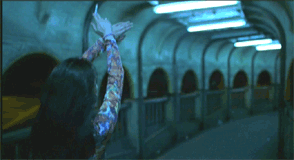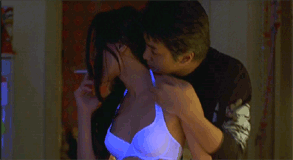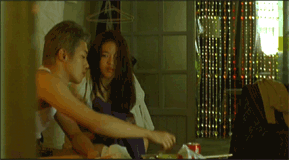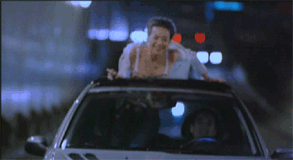Millennium Mambo (Hou Hsiao-hsien) 2001
 The slow-motion opening shot in Hou Hsiao-hsienís Millennium
Mambo tells us much about the mood of the film. Vicki (a superb Qi Shu), the
young protagonist, is seen moving down a hallway as a techno-beat thumps along
in the background. She looks back occasionally as she moves, alternating her
stride occasionally with a bit of a dance. When she nears the end of the hall,
the camera stops, but she keeps going, and we watch as she shuffles away. This
pre-title sequence sets the trajectory for the rest of the film, in which we
follow Vicki as she moves closer to the maturation that she thought she already
had. Unlike most coming of age films, Millennium Mambo is wise enough to
realize that there isnít some magical epiphany in which a character instantly
moves from childhood to adulthood.
The slow-motion opening shot in Hou Hsiao-hsienís Millennium
Mambo tells us much about the mood of the film. Vicki (a superb Qi Shu), the
young protagonist, is seen moving down a hallway as a techno-beat thumps along
in the background. She looks back occasionally as she moves, alternating her
stride occasionally with a bit of a dance. When she nears the end of the hall,
the camera stops, but she keeps going, and we watch as she shuffles away. This
pre-title sequence sets the trajectory for the rest of the film, in which we
follow Vicki as she moves closer to the maturation that she thought she already
had. Unlike most coming of age films, Millennium Mambo is wise enough to
realize that there isnít some magical epiphany in which a character instantly
moves from childhood to adulthood.
 The film is set in 2001, but is narrated by an unnamed
narrator who has gained a sense of wisdom and hindsight about the situation that
the young Vicki clearly lacks. The narrator refers to Vicki in the third person,
but she might very well be an older Vicki that has grown to such an extent that
she considers herself a wholly different individual. Most of the film finds this
younger Vicki immersed in a toxic, youth-oriented atmosphere. Thereís always
the distraction of a television, a cell phone, a videogame, or the ever-present
soundtrack to keep her from any sort of introspection. The constant immersion in
media has turned her into an adult prematurely. We find that she began having
sex and doing drugs at the age of sixteen. Worse yet, sheís involved with
Hao-Hao (Chun-hao Tuan), an abusive, overbearing young punk that moves from his
turntables, to his videogames, to her bed expecting the same sort of instant
gratification. Their series of breakups and reconciliations makes up much of the
filmís narrative. Watching Vicki as she becomes increasingly tired of his
immature behavior, we can see the first real stirrings of her emotional
development, and since Hao-Hao is such a sleaze, itís an immensely gratifying
process.
The film is set in 2001, but is narrated by an unnamed
narrator who has gained a sense of wisdom and hindsight about the situation that
the young Vicki clearly lacks. The narrator refers to Vicki in the third person,
but she might very well be an older Vicki that has grown to such an extent that
she considers herself a wholly different individual. Most of the film finds this
younger Vicki immersed in a toxic, youth-oriented atmosphere. Thereís always
the distraction of a television, a cell phone, a videogame, or the ever-present
soundtrack to keep her from any sort of introspection. The constant immersion in
media has turned her into an adult prematurely. We find that she began having
sex and doing drugs at the age of sixteen. Worse yet, sheís involved with
Hao-Hao (Chun-hao Tuan), an abusive, overbearing young punk that moves from his
turntables, to his videogames, to her bed expecting the same sort of instant
gratification. Their series of breakups and reconciliations makes up much of the
filmís narrative. Watching Vicki as she becomes increasingly tired of his
immature behavior, we can see the first real stirrings of her emotional
development, and since Hao-Hao is such a sleaze, itís an immensely gratifying
process.
 We might initially think that the Mambo of the title
is between Vicki and her boyfriend, but by the filmís end, it becomes apparent
that sheís dancing by herself, gracefully soft-shoeing between mature and
immature. Qi Shuís performance as Vicki is amazing, especially considering the
exceptionally long takes that Hou uses in shooting the film. She never seems so
confident that we feel her journey is over, but she also remains far enough from
meek that she can garner our respect. Even after she finally leaves Hao-Hao, and
moves into the eerily quiet apartment of an older mobster friend, she still
doesnít seem a perfect fit for the adult world. In one scene we see Vickiís
complete incomprehension of the gangster talk that surrounds her. She may have
aged a bit, but she still is a stranger to the responsibilities of adulthood.
We might initially think that the Mambo of the title
is between Vicki and her boyfriend, but by the filmís end, it becomes apparent
that sheís dancing by herself, gracefully soft-shoeing between mature and
immature. Qi Shuís performance as Vicki is amazing, especially considering the
exceptionally long takes that Hou uses in shooting the film. She never seems so
confident that we feel her journey is over, but she also remains far enough from
meek that she can garner our respect. Even after she finally leaves Hao-Hao, and
moves into the eerily quiet apartment of an older mobster friend, she still
doesnít seem a perfect fit for the adult world. In one scene we see Vickiís
complete incomprehension of the gangster talk that surrounds her. She may have
aged a bit, but she still is a stranger to the responsibilities of adulthood.
 Itís almost tragic that Vickiís environment encourages
her rapid growth, but itís an unfortunate side effect of the modern times that
she inhabits. Hou has covered this material from a male perspective before in
his Goodbye South, Goodbye, but Millennium Mambo, which echoes
that film most explicitly in its rapturous car-bound scenes, offers a more
optimistic, gentler prognosis for the problems of todayís youth. Since Vicki
and her friends arenít nearly the thugs that the characters from Goodbye
were, they are much easier to relate to and sympathize with. As a result the
film seems almost upbeat, since it allows us to understand the attraction to the
lifestyle that the youth culture engages in. This is quite unlike the
zombie-like trance that the technology created in the characters in Houís last
modern film. It doesnít hurt matters that the filmís even more beautiful
than Goodbye was either. Mark Lee Ping-bin, who shot both films, is quite
simply the greatest cinematographer in the world today, and the mixture of neon
colors on display in each of Houís extended takes is jaw-dropping. Without a
doubt, though, the most gorgeous image in the film occurs about midway through
when Vicki takes a short trip to snowy Japan. She and a friend, while frolicking
outside, press their faces into a snow bank. We are shown the impression that
her face makes in the snow, and understand at once the flowing, intangible
nature of self. The filmís message is simple, but beautiful: any impression
that we have of Vicki in a given time is a transient thing, as likely to
evaporate as that molding of her image.
Itís almost tragic that Vickiís environment encourages
her rapid growth, but itís an unfortunate side effect of the modern times that
she inhabits. Hou has covered this material from a male perspective before in
his Goodbye South, Goodbye, but Millennium Mambo, which echoes
that film most explicitly in its rapturous car-bound scenes, offers a more
optimistic, gentler prognosis for the problems of todayís youth. Since Vicki
and her friends arenít nearly the thugs that the characters from Goodbye
were, they are much easier to relate to and sympathize with. As a result the
film seems almost upbeat, since it allows us to understand the attraction to the
lifestyle that the youth culture engages in. This is quite unlike the
zombie-like trance that the technology created in the characters in Houís last
modern film. It doesnít hurt matters that the filmís even more beautiful
than Goodbye was either. Mark Lee Ping-bin, who shot both films, is quite
simply the greatest cinematographer in the world today, and the mixture of neon
colors on display in each of Houís extended takes is jaw-dropping. Without a
doubt, though, the most gorgeous image in the film occurs about midway through
when Vicki takes a short trip to snowy Japan. She and a friend, while frolicking
outside, press their faces into a snow bank. We are shown the impression that
her face makes in the snow, and understand at once the flowing, intangible
nature of self. The filmís message is simple, but beautiful: any impression
that we have of Vicki in a given time is a transient thing, as likely to
evaporate as that molding of her image.
* * * *
05-10-02
Jeremy Heilman